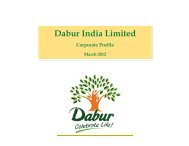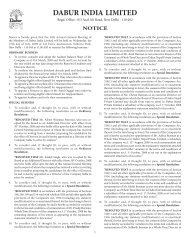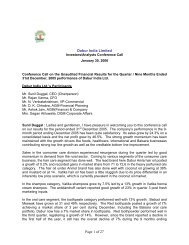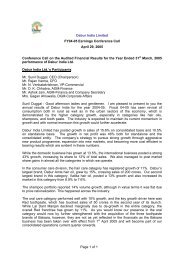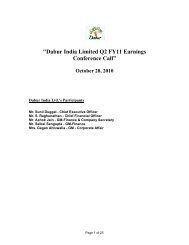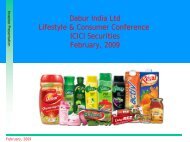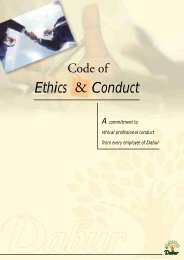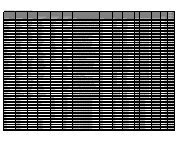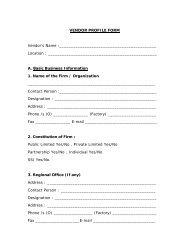young managers development programme (ymdp)
young managers development programme (ymdp)
young managers development programme (ymdp)
You also want an ePaper? Increase the reach of your titles
YUMPU automatically turns print PDFs into web optimized ePapers that Google loves.
Young Managers<br />
Development Programme<br />
Training Manual<br />
- 2002-03
TABLE OF CONTENTS<br />
BACKGROUND ...........................................................................................................................1<br />
YOUNG MANAGERS DEVELOPMENT PROGRAMME (YMDP).......................................2<br />
A. OBJECTIVES........................................................................................................................2<br />
B. FEATURES...........................................................................................................................2<br />
TRAINING PROGRAMME .....................................................................................................................................................2<br />
SUPPORT MECHANISMS ....................................................................................................................................................2<br />
FEEDBACK & EVALUATION................................................................................................................................................3<br />
ROLES...........................................................................................................................................4<br />
A. MENTOR..............................................................................................................................4<br />
B. TRAINER..............................................................................................................................4<br />
C. REVIEW COMMITTEE ..........................................................................................................4<br />
D. NATIONAL SALES TRAINING MANAGER .............................................................................5<br />
E. HR DEPARTMENT................................................................................................................5<br />
CORPORATE HR ...................................................................................................................................................................5<br />
ZONAL/ UNIT HR....................................................................................................................................................................5<br />
SALES & MARKETING TRAINEES.........................................................................................6<br />
A. TRAINING OBJECTIVES.......................................................................................................6<br />
B. COMPETENCIES..................................................................................................................6<br />
C. PROCESS ............................................................................................................................7<br />
D. EVALUATION .......................................................................................................................7<br />
MEASUREMENT METRICS .................................................................................................................................................7<br />
REVIEW PROCESS...............................................................................................................................................................7<br />
CSCC TRAINEES........................................................................................................................8<br />
A. TRAINING OBJECTIVES.......................................................................................................8<br />
B. COMPETENCIES..................................................................................................................8<br />
C. PROCESS ............................................................................................................................9<br />
D. EVALUATION .......................................................................................................................9<br />
MEASUREMENT METRICS .................................................................................................................................................9<br />
REVIEW PROCESS...............................................................................................................................................................9<br />
CPPD TRAINEES......................................................................................................................10<br />
A. TRAINING OBJECTIVES.....................................................................................................10<br />
B. COMPETENCIES................................................................................................................10<br />
C. PROCESS ..........................................................................................................................10<br />
Young Managers Development Programme (2002-03) ii
D. EVALUATION .....................................................................................................................10<br />
MEASUREMENT METRICS ...............................................................................................................................................10<br />
REVIEW PROCESS.............................................................................................................................................................11<br />
ENGINEER TRAINEES............................................................................................................12<br />
A. TRAINING OBJECTIVES.....................................................................................................12<br />
B. COMPETENCIES................................................................................................................12<br />
C. PROCESS ..........................................................................................................................12<br />
D. EVALUATION .....................................................................................................................12<br />
MEASUREMENT METRICS ...............................................................................................................................................12<br />
REVIEW PROCESS.............................................................................................................................................................13<br />
Young Managers Development Programme (2002-03) iii
BACKGROUND<br />
Recruitment is an integral and ongoing process in any organization. This holds true for Dabur also. We have a two-<br />
pronged approach in recruiting dynamic professionals – lateral recruitments and the Management Trainee/ Engineer<br />
Trainee recruitments at entry level.<br />
The Management Trainee/ Engineer Trainee Programme has been a focus area to induct <strong>young</strong> and vibrant<br />
professionals at the entry level. With every passing year, upgradations are made to it to make the learning experience<br />
more enriching and rigorous with a greater focus on functional and conceptual inputs and an objective learning<br />
evaluation system.<br />
This need led to the Young Managers Development Programme being conceived.<br />
Young Managers Development Programme (2002-03) 1
YOUNG MANAGERS DEVELOPMENT PROGRAMME (YMDP)<br />
The genesis of the Young Managers Development Programme is from the Management Trainee/ Engineer Trainee<br />
Programme. YMDP has been conceived with the primary purpose of providing a more focused approach towards<br />
functional and cross-functional training inputs. Moreover, a more integrated and scientific metric for evaluating<br />
learning of trainees has been developed to help them evolve as better <strong>managers</strong> through constant evaluation and<br />
feedback.<br />
A. OBJECTIVES<br />
1. To groom <strong>managers</strong> of tomorrow.<br />
2. To instill a sense of camaraderie and develop a vibrant and progressive culture<br />
B. FEATURES<br />
TRAINING PROGRAMME<br />
1. The YMDP has a structured approach and a fixed training schedule to standardize the training processes and<br />
systems.<br />
2. The YMDP has focused core functional training to develop a sound conceptual foundation for the trainees.<br />
3. Cross-functional exposure is an integral component of this <strong>programme</strong> to develop a better sense of inter-<br />
functional interlinkages.<br />
4. Projects are an important focus area in the YMDP. The purpose of this being to develop a better understanding<br />
of Dabur’s business among trainees by ensuring that they utilize their training experience, cross-functional<br />
exposure and business concepts in providing practical solution to real business problems.<br />
5. Classroom training provides YMDP Sales & Marketing trainees with sound conceptual inputs regarding their<br />
core functional area and also acts as a forum for them to exchange their experiences and ideas.<br />
6. On-job-training exposes the YMDP trainees to real life business situations along with actual responsibilities and<br />
authority to handle them.<br />
7. Presentations provide a summary of conceptual knowledge acquired by trainees during training.<br />
SUPPORT MECHANISMS<br />
1. Mentors have a vital role to play in the YMDP. They are a support mechanism for the trainees who can counsel<br />
them regarding their training and other professional or personal issues concerning them.<br />
2. Trainers ensure that training inputs are provided and training schedule is implemented.<br />
3. Review Committee comprises of the senior management who comprehensively review the trainees.<br />
Young Managers Development Programme (2002-03) 2
FEEDBACK & EVALUATION<br />
1. The learning evaluation is done through a combination of tests, presentations and evaluation by trainer.<br />
2. Feedback from trainees ensures that modifications can be made to the YMDP to ensure better quality training<br />
inputs.<br />
Young Managers Development Programme (2002-03) 3
ROLES<br />
A. MENTOR<br />
The mentors for YMDP Sales & Marketing trainees will be the Heads of Sales or Heads of Marketing of Family<br />
Products Division, Health Care Products Division or Dabur Foods. The mentor for the YMDP trainees from Functions<br />
will be the Head- HR, while the mentor for Operations will be GM (Operations). The mentor’s primarily role will be:<br />
1. To personally interact with trainees (atleast 3 times during the training period) and provide overall guidance by<br />
giving value adding inputs for their <strong>development</strong>.<br />
2. To act as a support mechanism for the trainee, wherein he/ she can communicate personal/ professional<br />
issues.<br />
3. To interact with trainers and follow up the progress of the trainees in terms of learning and quality of training<br />
inputs.<br />
4. To ensure that the trainer does not only implement the training <strong>programme</strong>, but also practices in spirit.<br />
5. To validate the objective and quality of the projects assigned to the trainee.<br />
6. To be part of the Review Committee to provide objective and comprehensive overview of the trainee.<br />
B. TRAINER<br />
The trainer’s primary role will be:<br />
1. To implement the training schedule in totality and in spirit.<br />
2. To personally guide and provide <strong>development</strong>al inputs to the trainee.<br />
3. To provide objective evaluation of trainee’s learning.<br />
4. To identify areas of improvements of their respective trainees and recommend/ implement inputs for<br />
improvement.<br />
5. To instill managerial and leadership qualities in trainees.<br />
6. To ensure that quality projects are assigned to trainees.<br />
C. REVIEW COMMITTEE<br />
The role of the Review Committee will be:<br />
1. To comprehensively review each trainee twice during the YMDP.<br />
2. To recommend subsequent course of action, which may be:<br />
� Recommending final confirmation of trainees at the end of YMDP, Or<br />
� Recommending another review of the trainee (after 3 months) if overall learning or conduct of the respective<br />
trainee is not as per the desired standards, Or<br />
� Recommending consequence management if overall learning or conduct of the respective trainee is not as per<br />
the desired standards.<br />
Young Managers Development Programme (2002-03) 4
D. NATIONAL SALES TRAINING MANAGER<br />
The National Sales Training Manager’s primary role will be:<br />
1. To develop training modules for classroom training.<br />
2. To develop tests to assess the conceptual understanding of trainees based on inputs imparted in classroom.<br />
E. HR DEPARTMENT<br />
CORPORATE HR<br />
The role of Corporate HR will be:<br />
1. To allocate trainers and mentors for individual trainees.<br />
2. To communicate overall training expectations to the trainees and their respective trainers.<br />
3. To track and analyze learning of the trainees.<br />
4. To consolidate identified areas of improvement and subsequently follow-up in terms of recommended<br />
inputs for improvement of the respective trainees.<br />
5. To ensure that Zonal/ Unit HR does subsequent follow-ups in terms of the adherence of schedule by trainers,<br />
collection of assessment forms from trainers and feedback given to and taken from trainees.<br />
6. To regularly interact and counsel trainees (wherever required).<br />
7. To ensure that the designated mentors interact and meet their respective trainees regularly.<br />
ZONAL/ UNIT HR<br />
The role of Zonal/ Unit HR will be:<br />
1. To ensure that the trainers in their Zone/ Unit adhere to the training schedule in totality and in spirit.<br />
2. To collect learning assessment forms of trainees from their respective trainers.<br />
3. To give and take feedback from the trainees regularly.<br />
4. To be responsible for the welfare of trainees in their respective Zone/ Unit.<br />
Young Managers Development Programme (2002-03) 5
SALES & MARKETING<br />
TRAINEES<br />
A. TRAINING OBJECTIVES<br />
To develop the competencies in a trainee to<br />
independently manage a sales system and field<br />
force by developing a sound understanding of:<br />
1. Sales and marketing fundamentals of Dabur<br />
2. Objectives and tasks of sales and marketing<br />
functions<br />
3. Roles of the sales <strong>managers</strong> and field force<br />
4. Role of the marketing organization<br />
5. Channels of distribution, structure and dealing<br />
with the trade of different SBU<br />
6. Nature and organization of resources and how<br />
they can be optimized<br />
7. Field force management<br />
8. Linkages between the sales and marketing<br />
functions and other functions.<br />
9. Practical application of marketing mix<br />
fundamentals<br />
B. COMPETENCIES<br />
Sales planning and management<br />
� Preparation of sales plan<br />
� Techniques to utilize resources as per plan (for<br />
e.g. appointing merchandisers, designing local<br />
level promotions etc.)<br />
� Fundamental understanding of sales structure<br />
and systems<br />
� Development of sales systems<br />
� Improve sales efficiency index<br />
� Distribution pipeline monitoring and control<br />
� Sales skew analysis<br />
� Strengthening distribution systems through<br />
innovative ideas<br />
Field force management<br />
� Leadership skills<br />
� Team <strong>development</strong><br />
� Communication<br />
� Motivation<br />
� Conflict resolution and counseling<br />
Cost control<br />
� Wastage identification in distribution system<br />
� Develop systems to monitor and control costs<br />
Brand implementation<br />
� Implementing brand plan<br />
� Developing critical path analysis for each<br />
activity<br />
� Coordination with other departments<br />
� Resource allocation techniques<br />
Consumer and trade promotions <strong>development</strong><br />
� Identification of type of promotion<br />
� Timeliness of promotions<br />
� Development of plan as per budget<br />
� Knowledge of sales fundamentals<br />
� Developing systems and control to track and<br />
measure effectiveness<br />
� Flexibility in responding to changing business<br />
scenarios<br />
Advertising<br />
� Understand working of Ad agency<br />
Marketing research<br />
� Identification of type of research methodology<br />
� Understanding of different MR techniques and<br />
Young Managers Development Programme (2002-03) 6<br />
tools
C. PROCESS<br />
1. Orientation 3 days<br />
2. Conceptual overview – I 3 days<br />
3. Sales training – I 15 weeks<br />
4. Cross-functional 1 week<br />
5. Marketing 14 weeks<br />
6. Presentation – I 2 days<br />
7. Conceptual overview – II 3 days<br />
8. Sales training – II 8 weeks<br />
9. Sales project 4 weeks<br />
10. Presentation – II 2 days<br />
11. On-job-training 8 weeks<br />
D. EVALUATION<br />
52 weeks<br />
The role of the learning evaluation system in the<br />
YMDP is to ensure objective tracking and<br />
measurement of every trainee’s learning and also<br />
validate the quality of training inputs through<br />
different sources and instruments.<br />
MEASUREMENT METRICS<br />
The YMDP Sales & Marketing trainees will be<br />
evaluated on:<br />
1. Functional & conceptual knowledge<br />
2. Behavioural attributes<br />
These metrics will be evaluated through a<br />
combination of tests, presentations and overall<br />
learning on the sales and marketing training stints.<br />
REVIEW PROCESS<br />
Comprehensive review of all Sales & Marketing<br />
trainees will be done twice during the YMDP by the<br />
Review Committee at the time of Presentation I &<br />
Young Managers Development Programme (2002-03) 7<br />
II.<br />
The final confirmation of the YMDP trainees will be<br />
on the basis of the Review Committee’s<br />
recommendations.<br />
If the overall learning of the trainee is not as per the<br />
desired standards, this committee may either<br />
recommend review of the trainee’s learning after 3<br />
months from the current review or termination of the<br />
employment contract of the trainee.
CSCC TRAINEES<br />
A. TRAINING OBJECTIVES<br />
To develop the competencies in a trainee to<br />
manage a supply chain system by developing a<br />
sound understanding of:<br />
1. Supply chain fundamentals<br />
2. Objectives and tasks of Central Supply Chain<br />
Cell<br />
3. Sales fundamentals of Dabur<br />
4. Production units, processes, capacities etc.<br />
5. Channels of sales distribution, structure and<br />
dealing with the trade of different SBU<br />
6. Nature and organization of resources and how<br />
they can be optimized<br />
7. Linkages between CSCC and other functions.<br />
B. COMPETENCIES<br />
Forecasting<br />
� Forecasting techniques<br />
� Scenario analysis techniques<br />
� Data interpretation<br />
Logistics management<br />
� Freight rates and structures<br />
� Knowledge of sales tax/ excise and other<br />
related legal requirements<br />
� Shortest path analysis<br />
� Knowledge of Decision Support Systems<br />
C&FA management<br />
� Knowledge of C&FA operations<br />
� Inventory management techniques<br />
� Knowledge of order management and invoicing<br />
process<br />
MIS management<br />
� Knowledge of BaaN<br />
� Knowledge of MFG-PRO<br />
� Knowledge of DOS<br />
� Knowledge of different sales & marketing MIS<br />
formats<br />
Sales & distribution fundamentals<br />
� Sales planning – Rolling Sales Forecast (RSF)<br />
� Sales resource allocation techniques<br />
� Fundamental understanding of sales structure<br />
and systems<br />
� Distribution pipeline monitoring and control<br />
� Sales skew analysis<br />
Marketing fundamentals<br />
� Implementing brand plan<br />
� Marketing resource allocation techniques<br />
� Consumer and trade promotions <strong>development</strong><br />
� Timeliness of promotions<br />
� Developing systems and control to track and<br />
measure effectiveness<br />
Production fundamentals<br />
� Knowledge of production process<br />
� Production planning – Rolling Production Plan<br />
(RPP)<br />
� Production scheduling (as per RPP)<br />
Budgeting & cost control<br />
� Costing fundamentals<br />
� Techniques for wastage identification in<br />
distribution system<br />
� Develop systems to monitor and control costs<br />
� Cost benefit analysis techniques<br />
Miscellaneous<br />
� Inter-departmental coordination<br />
� Written and verbal communication skills<br />
� Negotiation skills<br />
Young Managers Development Programme (2002-03) 8
C. PROCESS<br />
1. Orientation 3 days<br />
2. Conceptual overview 3 days<br />
3. Sales training 10 weeks<br />
4. Cross-functional 4 days<br />
5. Operations training 4 weeks<br />
6. Marketing training 2 weeks<br />
7. Presentation – I 1 day<br />
8. On-job-training 34 weeks<br />
9. Presentation – II 1 day<br />
D. EVALUATION<br />
52 weeks<br />
The role of the learning evaluation system in the<br />
YMDP is to ensure objective tracking and<br />
measurement of every trainee’s learning and also<br />
validate the quality of training inputs through<br />
different sources and instruments.<br />
MEASUREMENT METRICS<br />
The YMDP CSCC trainees will be evaluated on:<br />
1. Functional & conceptual knowledge<br />
2. Behavioural attributes<br />
These metrics will be evaluated through a<br />
combination of tests, presentations and overall<br />
learning on the sales and on-job training stints.<br />
REVIEW PROCESS<br />
Comprehensive review of CSCC trainees will be<br />
done twice during the YMDP by the Review<br />
Committee at the time of Presentation I & II.<br />
The final confirmation of the YMDP trainees will be<br />
on the basis of the Review Committee’s<br />
recommendations.<br />
If the overall learning of the trainee is not as per the<br />
desired standards, this committee may either<br />
recommend review of the trainee’s learning after 3<br />
months from the current review or termination of the<br />
employment contract of the trainee.<br />
Young Managers Development Programme (2002-03) 9
CPPD TRAINEES<br />
A. TRAINING OBJECTIVES<br />
To develop the competencies in a trainee to<br />
manage a purchase and procurement system by<br />
developing a sound understanding of:<br />
1. Purchase and procurement fundamentals of<br />
Dabur<br />
2. Objectives and tasks of CPPD<br />
3. Channels of procurement, structure and<br />
dealing with the vendors of commodities and<br />
packaging materials<br />
4. Nature and organization of resources and how<br />
they can be optimized<br />
5. Linkages between CPPD and other functions.<br />
B. COMPETENCIES<br />
Forecasting<br />
� Designing forecasting models<br />
� Scenario analysis techniques<br />
� Data interpretation<br />
Logistics management<br />
� Freight rates and structures<br />
� Knowledge of excise and other related legal<br />
requirements<br />
� Shortest path analysis<br />
� Knowledge of Decision Support Systems<br />
MIS management<br />
� Knowledge of BaaN<br />
� Knowledge of MFG-PRO<br />
� Knowledge of different MIS formats<br />
Sales & distribution fundamentals<br />
� Sales planning – Rolling Sales Forecast (RSF)<br />
� Sales resource allocation techniques<br />
Marketing fundamentals<br />
� Implementing brand plan<br />
� Marketing resource allocation techniques<br />
� Consumer and trade promotions <strong>development</strong><br />
� Timeliness of promotions<br />
Budgeting & cost control<br />
� Costing fundamentals<br />
� Wastage identification in distribution system<br />
� Develop systems to monitor and control costs<br />
� Cost benefit analysis techniques<br />
Production fundamentals<br />
� Knowledge of production process<br />
� Production planning – Rolling Production Plan<br />
(RPP)<br />
� Production scheduling<br />
Miscellaneous<br />
� Inter-departmental coordination<br />
� Written and verbal communication skills<br />
� Negotiation skills<br />
� Knowledge of commodity markets & packaging<br />
materials<br />
� Basic understanding of technical equipments<br />
for packaging materials<br />
C. PROCESS<br />
1. Orientation 3 days<br />
2. On-job-training 44 weeks<br />
3. Presentation – I 1 day<br />
(After 22 weeks of on-job-training)<br />
4. Presentation – II 1 day<br />
5. Cross-functional 3 weeks<br />
6. Operations training 4 weeks<br />
D. EVALUATION<br />
52 weeks<br />
The role of the learning evaluation system in the<br />
YMDP is to ensure objective tracking and<br />
measurement of every trainee’s learning and also<br />
validate the quality of training inputs through<br />
different sources and instruments.<br />
MEASUREMENT METRICS<br />
The YMDP CPPD trainees will be evaluated on:<br />
Young Managers Development Programme (2002-03) 10
1. Functional & conceptual knowledge<br />
2. Behavioural attributes<br />
These metrics will be evaluated through a<br />
combination of tests, presentations and overall<br />
learning on the on-job training stints.<br />
REVIEW PROCESS<br />
Comprehensive review of CPPD trainees will be<br />
done twice during the YMDP by the Review<br />
Committee at the time of Presentation I & II.<br />
The final confirmation of the YMDP trainees will be<br />
on the basis of the Review Committee’s<br />
recommendations.<br />
If the overall learning of the trainee is not as per the<br />
desired standards, this committee may either<br />
recommend review of the trainee’s learning after 3<br />
months from the current review or termination of the<br />
employment contract of the trainee.<br />
Young Managers Development Programme (2002-03) 11
ENGINEER TRAINEES<br />
A. TRAINING OBJECTIVES<br />
To develop the competencies in a trainee to<br />
manage an operations system by developing a<br />
sound understanding of:<br />
1. Operations fundamentals of Dabur<br />
2. Objectives and tasks of Operations<br />
3. Nature and organization of resources and how<br />
they can be optimized<br />
4. Linkages between Operations and other<br />
functions.<br />
B. COMPETENCIES<br />
Production fundamentals<br />
� Knowledge of production process<br />
� Production planning – Rolling Production Plan<br />
(RPP)<br />
� Production scheduling<br />
� Knowledge of GMP<br />
� Knowledge of different production lines and<br />
process<br />
� Basic understanding of engineering<br />
equipments in production<br />
Logistics management<br />
� Understanding logistics and its complexities<br />
MIS management<br />
� Knowledge of BaaN<br />
� Knowledge of MFG-PRO<br />
� Knowledge of different MIS formats<br />
Sales & distribution fundamentals<br />
� Sales planning – Rolling Sales Forecast (RSF)<br />
Marketing fundamentals<br />
� Implementing brand plan<br />
� Marketing resource allocation techniques<br />
Budgeting & cost control<br />
� Wastage identification in distribution system<br />
� Develop systems to monitor and control costs<br />
� Cost benefit analysis techniques<br />
Miscellaneous<br />
� Inter-departmental coordination<br />
� Written and verbal communication skills<br />
� Negotiation skills<br />
� Knowledge of statutory laws governing factory<br />
and labour<br />
C. PROCESS<br />
1. Orientation 3 days<br />
2. Cross functional 17 weeks<br />
3. Operations training – I 14 weeks<br />
4. Presentation – I 1 day<br />
5. Operations training – II 20 weeks<br />
6. Presentation – II 1 day<br />
D. EVALUATION<br />
52 weeks<br />
The role of the learning evaluation system in the<br />
YMDP is to ensure objective tracking and<br />
measurement of every trainee’s learning and also<br />
validate the quality of training inputs through<br />
different sources and instruments.<br />
MEASUREMENT METRICS<br />
The YMDP Engineer trainees will be evaluated on:<br />
1. Functional & conceptual knowledge<br />
2. Behavioural attributes<br />
These metrics will be evaluated through a<br />
combination of tests, presentations and overall<br />
learning on the on-job training stints.<br />
Young Managers Development Programme (2002-03) 12
REVIEW PROCESS<br />
Comprehensive review of Engineer trainees will be<br />
done twice during the YMDP by the Review<br />
Committee at the time of Presentation I & II.<br />
The final confirmation of the YMDP trainees will be<br />
on the basis of the Review Committee’s<br />
recommendations.<br />
If the overall learning of the trainee is not as per the<br />
desired standards, this committee may either<br />
recommend review of the trainee’s learning after 3<br />
months from the current review or termination of the<br />
employment contract of the trainee.<br />
Young Managers Development Programme (2002-03) 13



